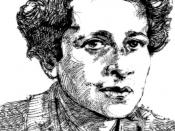Name: Annemarie Creutzberg
Student number: 10573845
Course: FPS 410
Assignment: 4
Hannah Arendt
Between Past and Future - Chapter 3
What is Authority?
�
I
Introduction
In this first chapter Arendt starts by saying that the title of this chapter is incorrect as it should be 'What was authority?' She says this because she believes that authority has disappeared from the modern world, due to the rise of political movements that wanted to replace the party systems, which took advantage of the political and social atmosphere of the time.�
What is authority historically speaking?
Arendt states that authority is often mistaken for some form of power or violence, as authority needs obedience. However, where force or argumentation is used authority has failed, as authority stems from a hierarchy, which is legitimate and recognized by the higher and the lower power of the hierarchy as a natural state as opposed to the Greek ways of persuasion and violence.�
Loss of authority was the final step after loss of tradition and loss of religion. Through the loss of tradition man has lost the 'safety nets' he knew throughout the past. However, now that we have lost tradition according to Arendt we could also look at it as a new way to view the past. She also says that without the past we as humankind will lose depth as that can only be reached by remembrance. Our loss of religion has caused us to doubt the spiritual authority of our religion and beliefs, which in turned exposed us to more doubt. � This laid the cornerstones for our loss of authority, as human beings need guidance in their mortal life.�
Authoritarian, Tyrannical and Totalitarian governments
Arendt illustrates quite clearly what the differences between these types of governments are:�
Authoritarian governments can be classified...


